- Home
- Robin Hobb
Dragon Keeper Free Edition with Bonus Material Page 17
Dragon Keeper Free Edition with Bonus Material Read online
Page 17
For the earthbound dragons, it had grown worse. For against all odds, Tintaglia had found a mate. All had believed that Tintaglia was the last true dragon in the world. To discover it was not so was shocking, and the tale of the black dragon who had risen from the ice was almost too far-fetched to believe.
Some prince of the far Six Duchies had unearthed the dragon, digging him out of an icy grave for reasons of his own, ones that did not matter to her. The black drake had not been dead after all; he had risen from his long and icy sleep and taken Tintaglia as his mate. They had flown off together to hunt and feed and mate. Wild as the tale was, one thing was unmistakably true: since that time, the queen dragon had returned to the Rain Wilds only sporadically. There were reports from some Rain Wilders that they had seen the two great dragons flying in the distance. Some said bitterly that now that she had no need of humans for companionship or aid, she had parted from them, not only abandoning to their care the ravenous young dragons but ceasing to cast her protective shadow over the waters of the Rain Wild River.
Even though Tintaglia had ceased to observe her end of their bargain, the Rain Wilders had little choice but to continue to care for the young dragons. As many had pointed out, the only thing worse than a herd of dragons living at the foot of your city was a herd of hungry, angry dragons living at the foot of your city. Although the cocooning grounds were substantially upriver of Trehaug, they were almost on top of the buried city of Cassarick. The most accessible parts of the ancient Elderling city beneath Trehaug had been mined of Elderling treasure long ago. Cassarick now seemed to offer the same potential, but only if the young dragons were kept in a frame of mind to allow the humans access to it.
Thymara wondered how many of the young dragons now remained alive. Not all of the serpents who entered their cocoons had emerged as dragons. The last time her father had journeyed to Cassarick, Thymara had gone with him. That had been a little more than two years ago. If she recalled correctly, there had been eighteen surviving creatures then. Disease, lack of fresh food, and battles among themselves had taken a heavy toll on them. She had watched from the trees, not venturing near. The dirty hulking creatures seemed tragic, almost obscene when she recalled the glittering newness of the freshly emerged dragons. They were large, ill-formed hulks, smeared with mud, living in a trampled mucky area by the river. They stank. They stalked about listlessly, wading through their own droppings and nosing through the offal of old meals. None of the dragons had ever achieved the ability to fly. Some of them could hunt for their own food, in a very limited way. Their efforts consisted of wading out into the river and snatching at the migratory fish runs. A sensation of suppressed strife rose to her, thicker than their reptilian stench. She had turned away from them, unable to bear looking at the bony, ill-tempered creatures.
Thymara shook her head to clear it of memories and focus on her climb. She dug in her claws and moved up, into the branches that arched over the roof of her home. It was among the highest in Trehaug. From here, she looked down over most of the treetop city.
She drew her knees up under her chin and pondered as she sat watching nightfall devour the city and forest. She liked this particular perch. If she leaned out and angled herself just right, she had a tiny window up through all the intersecting branches, through which she could glimpse the night sky and the myriad stars that filled it. No one else, she thought, knew that such a view existed. It belonged to her alone.
For a short time, she had peace. Then she felt the small vibrations of the branch that told her that someone was coming to join her in her precarious perch. Not her father. No. This person moved more swiftly than her father did. She did not turn to look at him, but spoke as if she had seen him. “Hello, Tats. What brings you up to the canopy tonight?”
She felt him shrug. He’d been standing up on the branch. Now he dropped to all fours to creep along the narrow limb to join her. When he reached her, he sat up but locked his wiry legs around the branch beneath him. “Just felt like visiting,” the Tattooed boy said quietly. She finally turned her head to look at him.
Tats met her gaze without comment. She knew that recently her eyes had taken on the pale blue glow that some Rain Wilders had. He’d never commented on it, nor on her black claws. But then, she’d never asked any questions about the tattoos that sprawled across his face beside his nose. The one closest to his nose was a little horse symbol. The one that spread across most of his left cheek was a spider’s web. They marked that he had been born into slavery. She knew the bones of his tale. Six years ago, with the return of the serpents, the Rain Wild Council had invited the Tattooed of Bingtown to emigrate there. Many of the recently freed slaves had few other prospects. Some had been criminals, others had been debtors, but the tattoos of slavery had reduced them all to a near equal footing. The Council had invited them to journey up the Rain Wild River, to settle and intermarry, to begin new lives. In exchange, the Tattooed had offered their labor in dredging out the river shoals and building the water ladders that had allowed the serpents to complete their migration. Many of the Tattooed had gone on to become valued citizens of the Rain Wilds. Those who had been debtors were often skilled artisans or craftsmen, and they brought their talents to the Rain Wilds.
Unfortunately, some of them had been thieves, murderers, and pickpockets. And some of them brought those skills to the Rain Wilds as well. Despite the chance to make a new life, they had fallen back on what they knew. Tats’s mother had been one of them. Thymara had heard that she was a thief, and no more than that, until a burglary had gone wrong and turned into a murder. Tats’s mother had fled; no one knew where, least of all Tats, a boy of about ten at the time. Abandoned to his own devices, he had been fostered among the other Tattooed. Thymara had the impression that he had lived everywhere, and nowhere, picking up what food he could as it was offered to him, wearing castoffs, and doing whatever menial tasks he could to earn a coin or two for himself. She and her father had met him at one of the trunk markets, the large market days held closest to the huge trunks of the five main trees of central Trehaug. They had birds to sell that day, and he’d offered to do anything they needed, if only they’d give him the smallest one. He hadn’t had meat in months. Her father, as always, had been too kindhearted. He’d put the boy to hawking their wares, a task he usually did himself, and much better, for his voice was louder and more melodious. Still, Tats had been willing, no, eager to earn a meal for himself.
Since that day, two years ago, they’d seen him often. When her father could make work for him, he did, and Tats was always grateful for whatever they could spare. He was a handy fellow, even here in the high canopy where folk who had been born on the ground never ventured. Often enough, Thymara welcomed his company. She had few friends. The children who had socialized with her when she was small had long grown up, wedded, and commenced new lives as parents and partners. Thymara had been left behind in her strangely extended adolescence. It was oddly comforting to have found a friend who was as single as she was. She wondered why he wasn’t married or at least courting by now.
Her thoughts had wandered. She only realized that her silence had grown long when he asked her, “Did you want to be alone tonight? I don’t intend to bother you.”
“No, you’re no bother, Tats. I was just taking some time to myself to think.”
“About what?” He settled himself more firmly on the branch.
“I’m considering my options for my future. Not that there are many.” She managed a laugh.
“No? Why not?”
She looked at him, wondering if he were teasing. “Well, I’m sixteen years old and still living with my parents. No one’s ever made an offer for me and no one ever will. So, either I live with my parents until the end of my days, or I strike out on my own. I know something about hunting, and I know something about gathering. But what I mostly know about both of them is that if I try to go it alone with those as my only skills, I’m going to lead a skimpy life. In the Rain Wilds, it always s
eems to take at least two people in partnership, working hard, to keep skin and bone together. And I’m always going to be just one.”
Tats looked startled at her flood of words and a bit uncomfortable. He cleared his throat. “Why you think you’re always going to have to make it on your own?” More quietly he added, “You talk about living with your parents like it’s terrible. Me, I’d love to have a mother or a father to stay with.” He gave a short laugh. “I can’t even imagine having both.”
“Living with my parents isn’t terrible,” she admitted. “Though sometimes, I know my mother wishes I weren’t around. Da is always good to me; he lets me know I’m welcome to stay for always. I suppose that when he brought me back home, he knew then that I’d probably be underfoot for the rest of my life.”
Tats knit his brows. His confused scowl made the spiderweb across his cheek crawl strangely. “Brought you back home? Where had you gone?”
It was Thymara’s turn to feel awkward. She’d always supposed that everyone knew what she was and the story behind it. Any Rain Wilder would be able to tell just by looking at her. But Tats wasn’t Rain Wilds born, and she and her kind were not something the Rain Wilders spoke about to outsiders. Just as some of them never spoke to her or looked directly at her, so her existence was not a topic for casual conversation with outsiders. That Tats didn’t know meant that most people still considered him an outsider. He truly didn’t know. The newness of that thought stung her. She gritted her teeth in a strange smile and held up her hand to him. “Notice anything?”
He leaned closer and peered at her hand. “You cracked one of your claws?”
She choked on a laugh, and suddenly understood something about him that she never had before. He’d acted friendly toward her because he truly didn’t know better.
“Tats, what you should notice is that I have claws. Not fingernails. Claws like a toad. Or a lizard.” She sank them into the branch and drew them back toward her, leaving four stripes of torn bark. “Claws make me what I am.”
“I’ve seen lots of Rain Wild folk with claws.”
She stared at him. Then she said, “No, you haven’t. You’ve seen lots of folk with black nails. Even thick black nails. But not claws. Because when a baby is born with claws instead of fingernails, the parents and the midwife know what they have to do. And they do it.”
He hitched closer to her on the branch. “Do what?” he asked hoarsely.
She looked away from his intent stare, into the interlacing branches that webbed the night. “Get rid of it. Put it somewhere, away from where people go. And leave it there.”
“To die?” He was shocked.
“Yes, to die. Or be eaten by something, a tree cat or a big snake.” She glanced back at him and found she couldn’t meet his horrified stare. It seemed accusing, and it made her feel ungrateful, as if she were being disloyal to talk about what happened to deformed children. “Sometimes they strangle the baby or smother it so it doesn’t suffer too long. And then they drop it in the river. It depends on the midwife, I guess. My midwife just put me out of the way; wedged me into a forking branch away from any path and hurried back to my mother, who was bleeding more than she should.” She cleared her throat. Tats was staring at her, his mouth slightly ajar. For the first time, she noticed that one of his middle bottom teeth slightly leaned past its neighbor. She glanced away from her rapt listener.
“The midwife didn’t know my father had followed her. I was not their first child, but I was the first one to be born alive. Da says he just couldn’t stand to let go of me, that he felt I deserved a chance. So he followed the midwife and he brought me back home, even though he knew a lot of people would say he was doing wrong.”
“Doing wrong? Why?”
She looked back at him, wondering if he were teasing her. He had pale eyes, blue or gray depending on the time of day. But they never glowed. Not like hers. They looked at her without guile. His earnest look almost exasperated her. “Tats, how can you not know these things? You’ve lived in the Rain Wilds for, what, six years? A lot of Rain Wild children are born, well, touched by the Wilds. And as they grow, they become even more different. So, well, people had to draw the line somewhere. Because, if you’re too different when you’re first born, if you already have scales and claws, then who knows what you’ll grow to be? And if the ones like me married and had children, well, those children would likely be even less close to human when they were born, and might grow to be Sa knows what.”
Tats took a deep breath and blew it out, shaking his head. “Thymara, you talk like you don’t think you’re human.”
“Well,” she said, and then stopped. For a time, she chased words around inside her mind. Maybe I’m not. Did she believe that? Of course not. Well, maybe not. What was she then, if not human? But if she was human, how could she have claws?
Tats spoke again before she could find words. “You don’t look that much stranger to me than most of the folk in the Rain Wilds. I’ve seen people here with a lot more scales and fringe than you have. Not that it bothers me now. When I was little, when I first came here, you were a pretty scary bunch. Not anymore. Now you’re just, well, people who are marked. Just like Tattooed were marked.”
“Your owners marked you. To say you were a slave.”
He flashed white teeth at her in a grin that denied her words. “No. They marked me to try to make people believe they owned me.”
“I know, I know,” she said quickly. It was a difference that many of the former slaves insisted on. She didn’t understand why it was so important to them, but it obviously was. She was willing to let him explain it however he liked. “But my point is that someone did it to you. Before then, you were just like everyone else. But me, I was born this way.” She turned her hand over and regarded her black claws curving in toward her palm. “Always different. Not fit for marriage.” She lowered her voice and looked away from him as she added, “Not even fit to live.”
He didn’t reply to her words. Instead he said quietly, “Your ma just came out and looked up here at us. She’s still down there, staring at me.” He shifted a tiny bit, ducking his shaggy head and bowing his shoulders in toward his narrow chest as if that would make him invisible. “She doesn’t like me, does she?”
Thymara shrugged. “Right now, it’s me that she really doesn’t like. We had a, well, a family disagreement earlier. My da and I came home from gathering, and my mother said that someone had made an offer for me. Not a marriage offer, but a work offer. So Da said I had work already and, well, she got angry and wouldn’t even say what the offer had been.” She sprawled back on the branch and sighed. The Rain Wild night was deepening around them. Lamps were being kindled in the little dangling houses. As far as she could see, the scattered sparks of the upper reaches of Trehaug sparkled through the network of branches and leaves. She shifted onto her belly and looked down; there, the lights were thicker and brighter in the more prosperous sections of the tree-built city. The lamplighters were at work now, illuminating the bridges that spanned the trees like glittering necklaces strung through the forest. Almost every evening it seemed there were more lights. Six years ago there had been a flood of Tattooed to swell the populations of Trehaug and Cassarick. And since then more and more outsiders had come. She’d heard that the little trading villages downriver had grown as well.
The light-sprinkled forest below was beautiful. And it was hers, yet it would never be hers. She gritted her teeth and spoke through them. “It’s frustrating. I’ve got few enough choices, and my mother is holding one back from me.” She glanced up at the skinny boy who shared the branch with her.
Tats’s grin, always startling in how it changed his face, suddenly broke through. “I know what your offer is. I think.”
“You know what?”
“I know what the offer was. Because I heard about it, too. That was one of the reasons I came up here tonight, to ask you and your da what you both thought of it. Because you’ve seen more of the dragons than I ha
ve.”
She sat up so suddenly that Tats gasped. But Thymara knew she was in no danger of falling. “What was the offer?” she demanded.
His face lit with enthusiasm. “Well, there was a fellow who was posting notices at every trunk market. He tacked one up and then read it to me. According to him, the Rain Wild Council is looking for workers, young, healthy workers, ‘with few attachments.’ Meaning no family, he said.” Tats paused suddenly in his excited telling. “So I guess that couldn’t be your offer, could it? Because you’ve got family.”
“Just tell,” Thymara demanded brusquely.
“Well, here is the gist of it. The dragons are getting to be too much trouble over at Cassarick. They’ve done some bad stuff, scaring people and acting up, and the Council has decided they have to be moved. So they’re looking for people to move them away from Cassarick. They need people to herd them along and get food for them, that sort of thing. And resettle them, and keep them from coming back.”
“Dragon keepers,” Thymara said softly. She looked away from Tats and tried to imagine what it would be like. From what she had seen of the dragons, they were not easily managed creatures. “I think it would be dangerous work. And that’s why they’re looking for orphans or people without family. So that no one complains when a dragon eats you.”
Tats squinted at her. “Seriously?”
“Well . . .”
“Thymara!” Her mother’s sharp call broke the night. “It’s getting late. Come in.”
She was startled. Her mother seldom called her name in public, let alone desired her presence. “Why?” she called down to her. Perhaps her father had come home and wanted her. She couldn’t recall that her mother had ever called her back into the house.

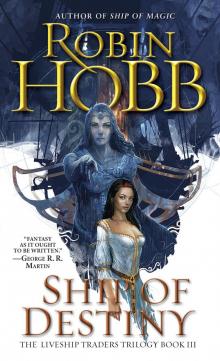 Ship of Destiny
Ship of Destiny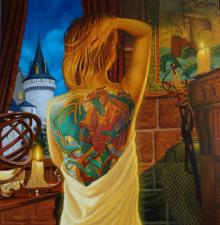 Golden Fool
Golden Fool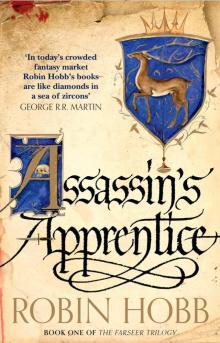 Assassins Apprentice
Assassins Apprentice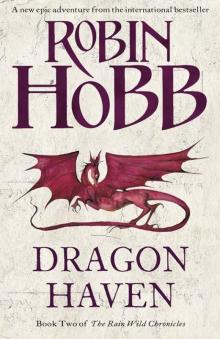 The Dragon Keeper
The Dragon Keeper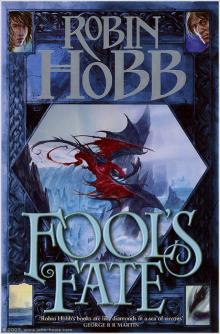 Fools Fate
Fools Fate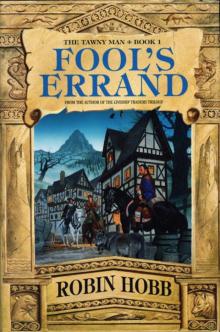 Fools Errand
Fools Errand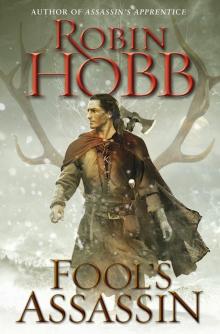 Fools Assassin
Fools Assassin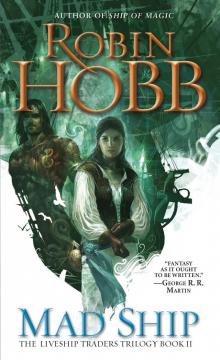 The Mad Ship
The Mad Ship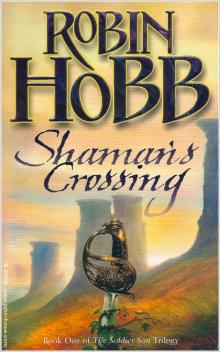 Shamans Crossing
Shamans Crossing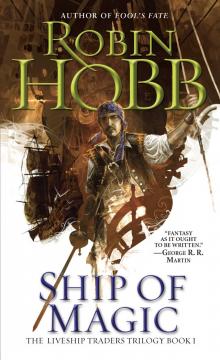 Ship of Magic
Ship of Magic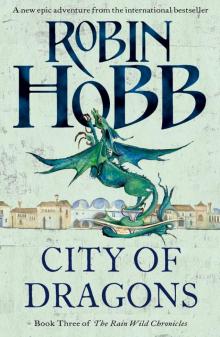 City of Dragons
City of Dragons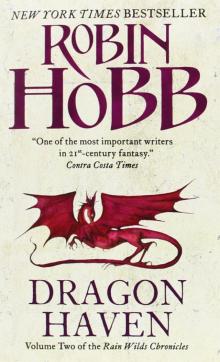 Dragon Haven
Dragon Haven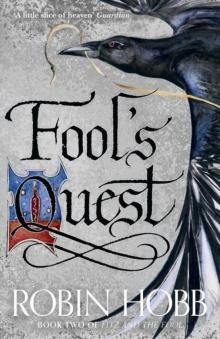 Fools Quest
Fools Quest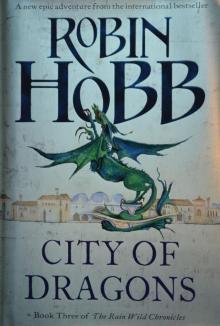 Blood of Dragons
Blood of Dragons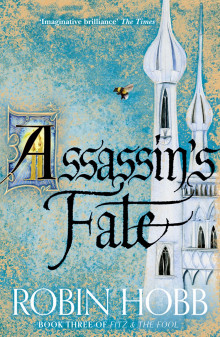 Assassin's Fate
Assassin's Fate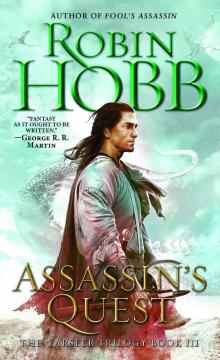 Assassins Quest
Assassins Quest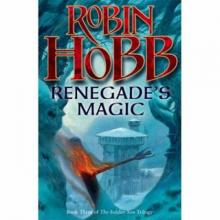 Renegades Magic
Renegades Magic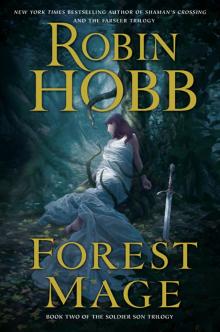 Forest Mage
Forest Mage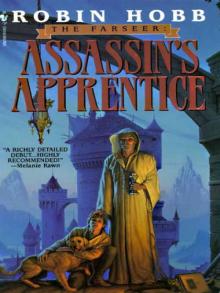 Assassin's Apprentice tft-1
Assassin's Apprentice tft-1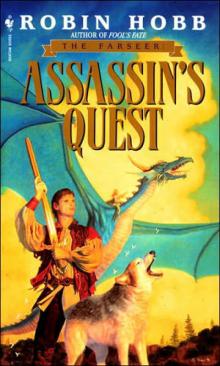 Assassin's Quest tft-3
Assassin's Quest tft-3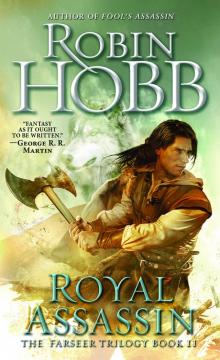 Royal Assassin
Royal Assassin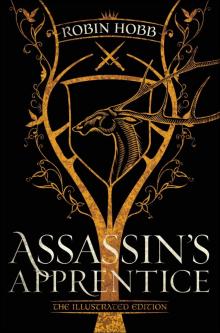 Assassin's Apprentice (The Illustrated Edition)
Assassin's Apprentice (The Illustrated Edition)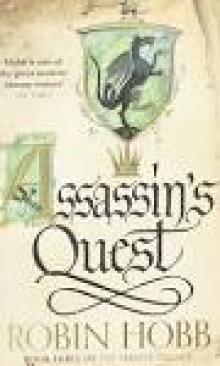 Assassin's Quest (UK)
Assassin's Quest (UK)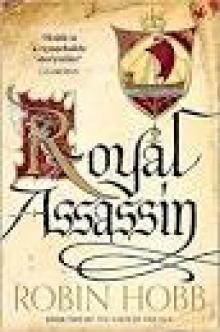 Royal Assassin (UK)
Royal Assassin (UK)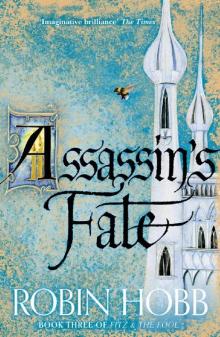 FF3 Assassin’s Fate
FF3 Assassin’s Fate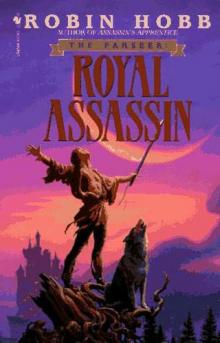 Royal Assassin tft-2
Royal Assassin tft-2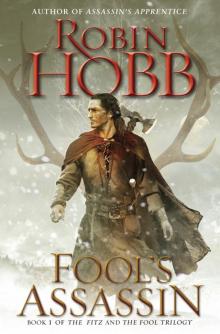 Fool’s Assassin: Book One of the Fitz and the Fool Trilogy
Fool’s Assassin: Book One of the Fitz and the Fool Trilogy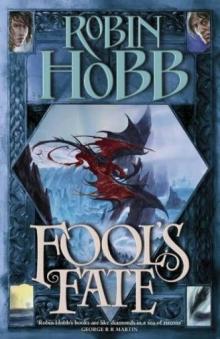 Fool's Fate ttm-3
Fool's Fate ttm-3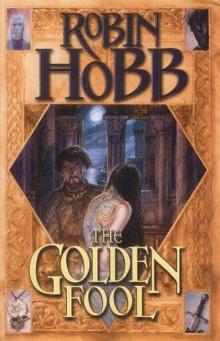 The Golden Fool ttm-2
The Golden Fool ttm-2 The Liveship Traders Series
The Liveship Traders Series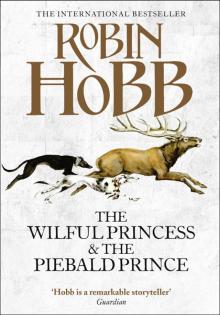 The Wilful Princess and the Piebald Prince
The Wilful Princess and the Piebald Prince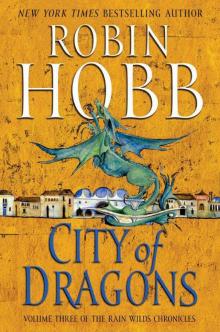 City of Dragons rwc-3
City of Dragons rwc-3 The Tawny Man 1 - Fool's Errand
The Tawny Man 1 - Fool's Errand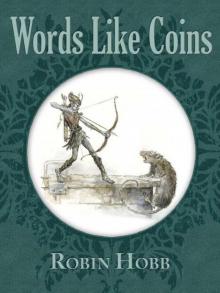 Words Like Coins
Words Like Coins The Complete Tawny Man Trilogy Omnibus
The Complete Tawny Man Trilogy Omnibus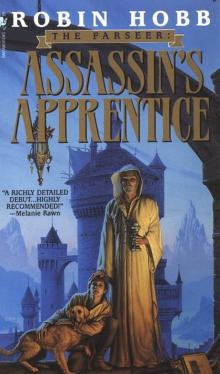 Farseer 1 - Assassin's Apprentice
Farseer 1 - Assassin's Apprentice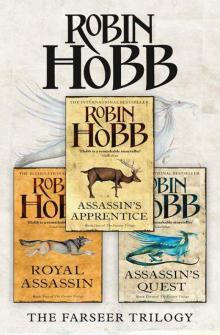 The Complete Farseer Trilogy Omnibus
The Complete Farseer Trilogy Omnibus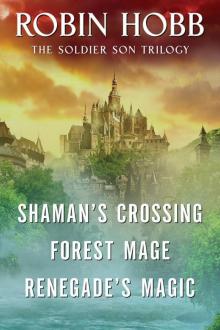 The Soldier Son Trilogy Bundle
The Soldier Son Trilogy Bundle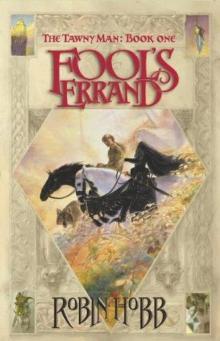 Fool's Errand ttm-1
Fool's Errand ttm-1 Blue Boots
Blue Boots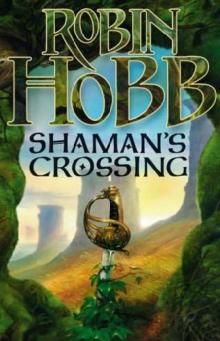 Shaman's Crossing ss-1
Shaman's Crossing ss-1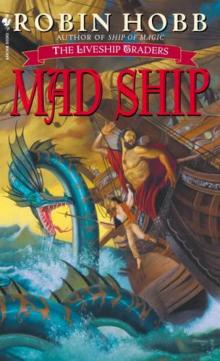 Mad Ship
Mad Ship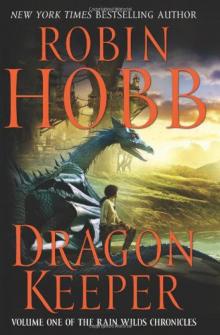 Dragon Keeper
Dragon Keeper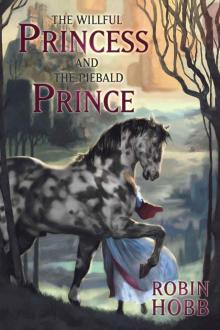 The Willful Princess and the Piebald Prince
The Willful Princess and the Piebald Prince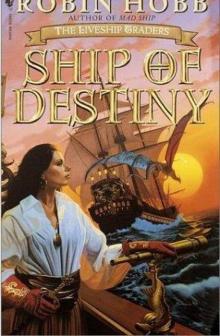 Ship of Destiny tlt-3
Ship of Destiny tlt-3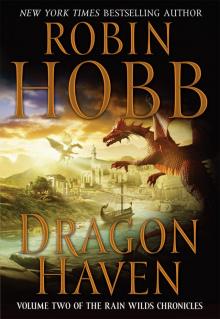 Rain Wild Chronicles 02 - Dragon Haven
Rain Wild Chronicles 02 - Dragon Haven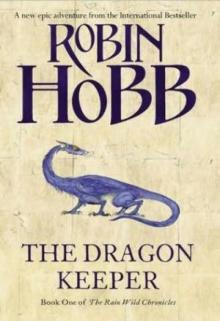 The Dragon Keeper trwc-1
The Dragon Keeper trwc-1 The Triumph
The Triumph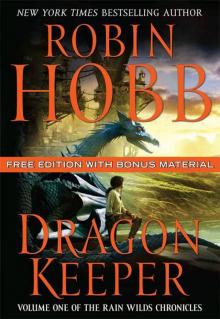 Dragon Keeper Free Edition with Bonus Material
Dragon Keeper Free Edition with Bonus Material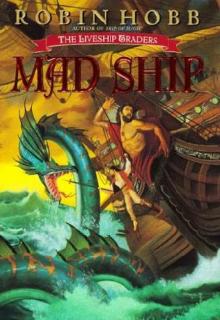 Mad Ship tlt-2
Mad Ship tlt-2 The Inheritance and Other Stories
The Inheritance and Other Stories Tawny Man 02 - Golden Fool
Tawny Man 02 - Golden Fool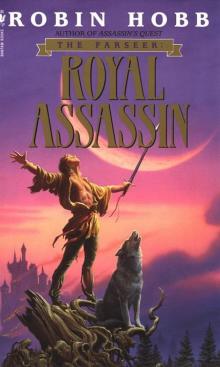 Farseer 2 - Royal Assassin
Farseer 2 - Royal Assassin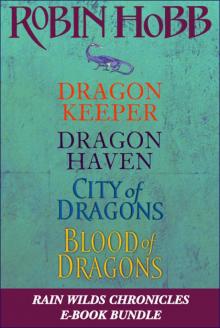 Rain Wilds Chronicles
Rain Wilds Chronicles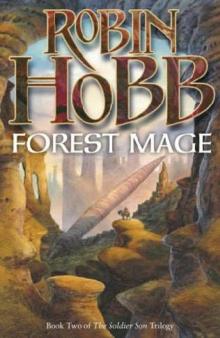 Forest Mage ss-2
Forest Mage ss-2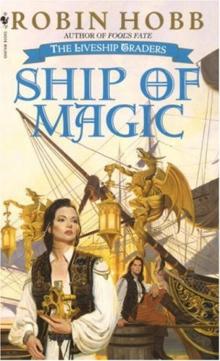 Ship of Magic lt-1
Ship of Magic lt-1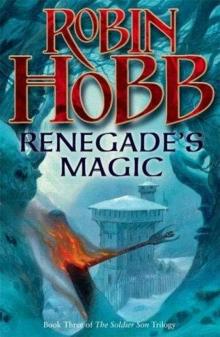 Renegade's Magic ss-3
Renegade's Magic ss-3